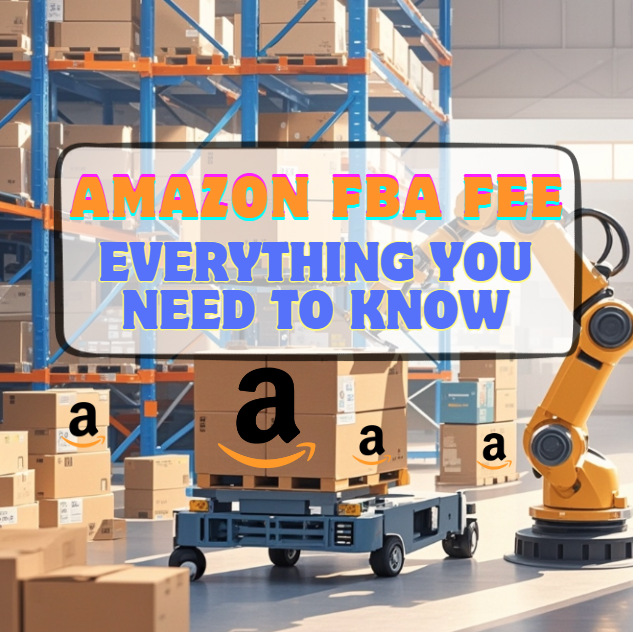- Order Management
- TikTok Shop
- Temu
- About 4Seller
- Amazon
- Shopify
- Inventory Management
- Amazon MCF&FBA
- Seller Tips
- Listing Management
- UPS
- Amazon Shipping
- FedEx
- DHL Express
- Creator Bulk Invite
- eBay
- GLS
- Shein
- Marketplace News
- Inventory Sync
- Multi-channel Store
- Royal Mail
- Amazon MCF
- Walmart
- Walmart WFS
- WooCommerce
- Shipping Integration
- Poste Italiane
- PayPal Tracking Sync
- BRT
- Beginner Tutorial
- ShipHero
- Shipping Label
- CaiNiao
- Stripe Tracking Sync
- UniUni
- USPS
- Yodel
- CIRRO
- Chronopost
- Correos
- Correos Express
- Deutsche Post
- Logistics Rule
- 3PL
- Kaufland
- GOFO
- OTTO
- DHL Parcel
- Evri
- Etsy
- FBM
- DHL
- AliExpress
- DPD
- SPU Catalog
- Cdiscount
- ShipBob
- OMS
- Request Review
- Price Sync
- Platform Integration
Everything You Need to Know About Amazon FBA Fees
 By Joline26 Sep,2024
By Joline26 Sep,2024
Fulfillment By Amazon (FBA) facilitates ecommerce retailers in storing their products in Amazon's warehouses, independent of their Amazon sales status, and entrusts Amazon with packaging and shipping duties.
FBA not only expedites fulfillment but also offers customer service support to retailers, along with marketing perks like eligibility for Super Saver Shipping and Amazon Prime. These advantages have significantly contributed to the growth of small businesses, with Bobsled Marketing's founder, Kiri Masters, claiming a 30-50% sales boost for online retailers leveraging FBA.
However, while the FBA trend may seem alluring, it's crucial to recognize that it entails various costs, both overt and subtle and the metric how to automate orders fulfillment via Amazon FBA via 4Seller, which users must meticulously evaluate before embarking on this journey.
Amazon FBA Fees are Dependent on Product Size and Weight
Amazon FBA fees are contingent upon product dimensions, weight, and sales channels. Sellers incur two primary fee types:
- Fulfillment Fees: Encompassing packaging, shipping, and Amazon's customer service support.
- Monthly Inventory Storage Fees: Covering the cost of keeping items in Amazon's fulfillment centers.
These fees are segmented based on product size and shipping weight, categorized as standard or oversize:
- Standard-Size Products: Dimensions not exceeding 15″ x 12″x 0.75″.
- Oversize Products: Dimensions exceeding 18" x 14" x 8".

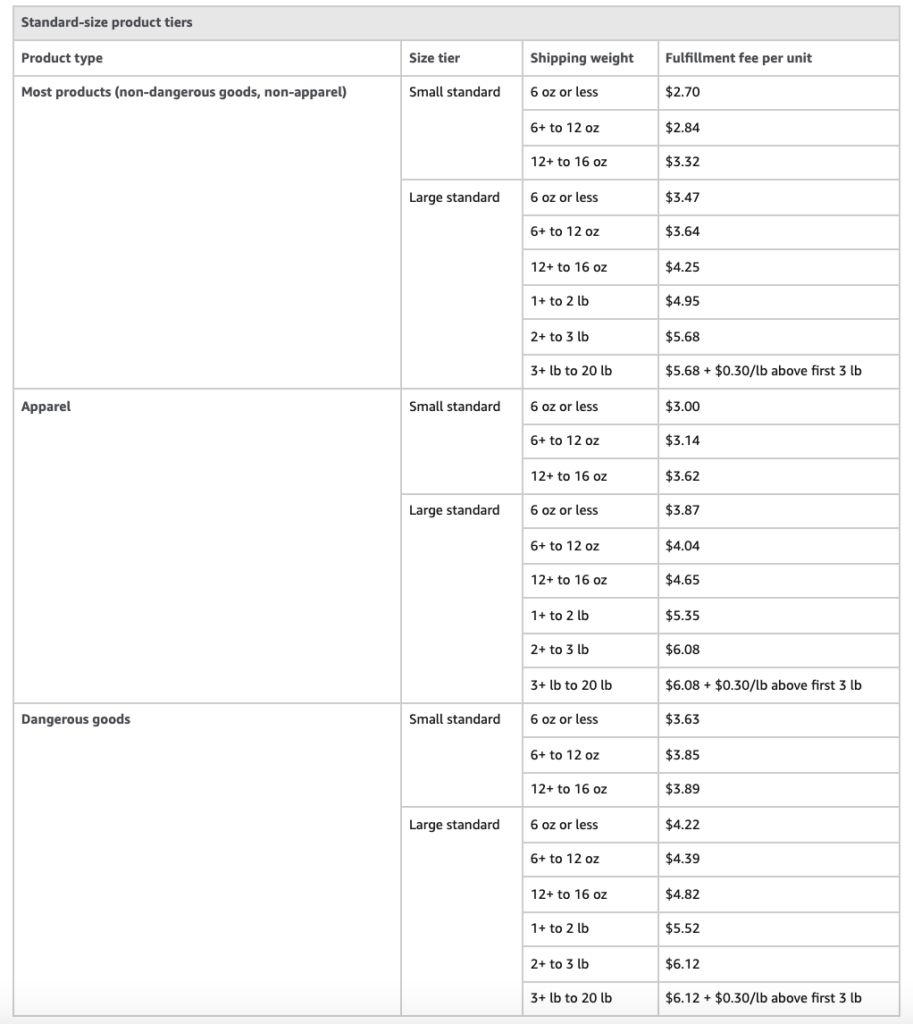
Amazon FBA fees for standard-sized products are uniform across domestic and international orders. However, oversize products adhere to a distinct tiered structure for determining fulfillment fees.
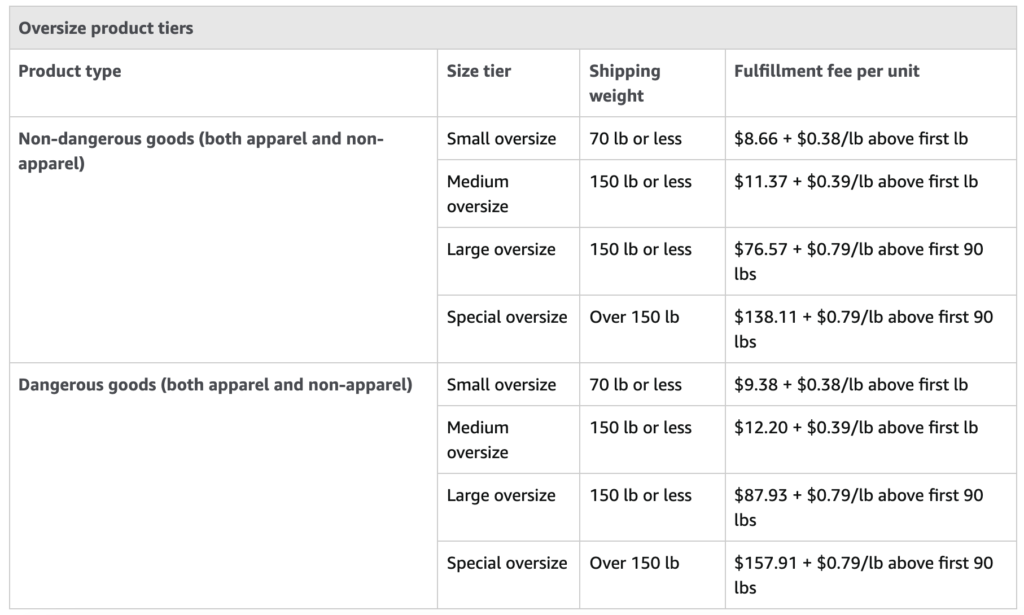
Refer to the table below for an overview of how product dimensions and weight influence their fulfillment fees.
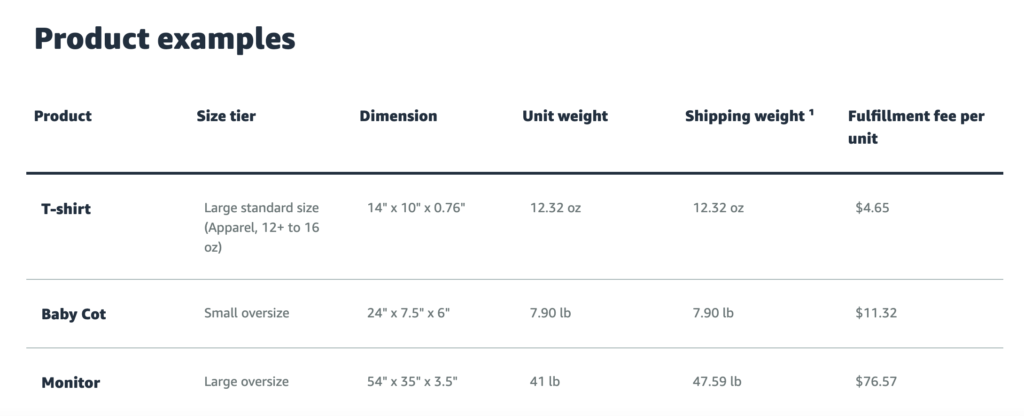
It's evident that smaller, lighter items like T-shirts incur minimal fulfillment fees. Conversely, larger or heavier products escalate these fees. Additionally, a product's standard or oversize status dictates its storage fee. Notably, FBA storage fees peak during the holiday season, from October to December, as reflected in the table below.
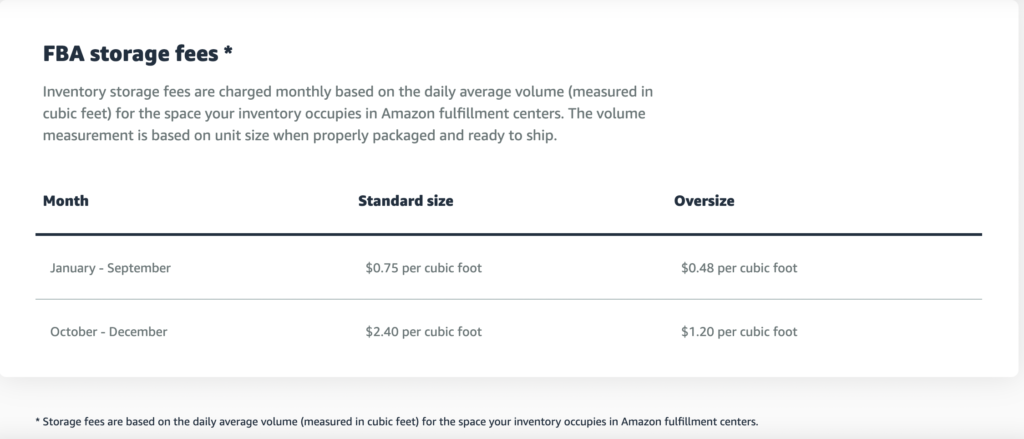
Storage fees are elevated for specific products categorized as "dangerous goods." Furthermore, long-term storage fees, in addition to monthly storage fees, apply to items residing in Amazon fulfillment centers for over a year.
For a comprehensive review of Amazon's product size guidelines, please refer here.
FBA fulfillment fees for products sold outside Amazon are higher
Amazon holds nearly 50% of the ecommerce market share, yet 80% of Amazon merchants expand sales beyond Amazon to channels like personal websites, eBay, or Shopify stores. This multi-channel fulfillment (MCF) service, where Amazon handles storage, packing, and shipping for non-Amazon orders, incurs slightly higher fees. MCF fees vary by product size, storage duration, shipping speed (standard, expedited, or priority), and whether the product is standard or oversize. For instance, a 5-ounce standard-size T-shirt shipped via standard MCF would incur a fee of $5.95, as shown in the chart.
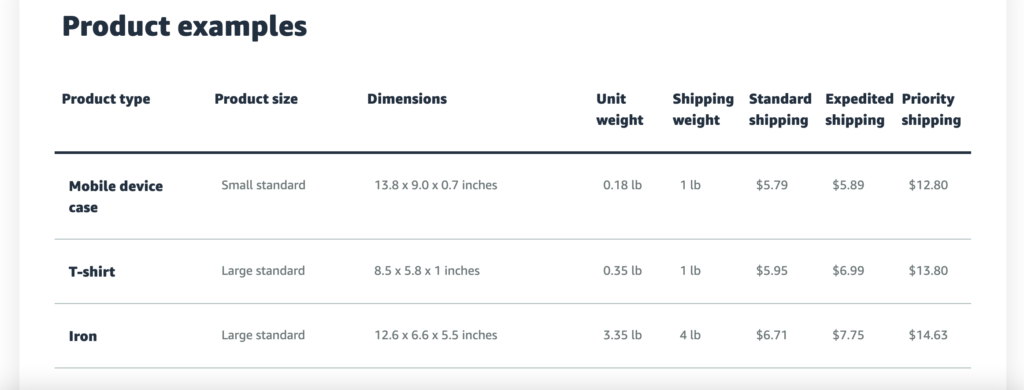
Access the comprehensive list of multi-channel fulfillment pricing by clicking here.
Additional Amazon FBA Fees to Keep in Mind
While not all sellers will encounter all additional fees, it's crucial to factor them into your budget planning.
Selling fees
If you’re selling items on Amazon with an Individual Selling plan, you’ll pay a per-item selling fee of $0.99 on each product sold. If you have a Professional Selling Plan, you’ll pay $39.99 a month and have no per-item fee.
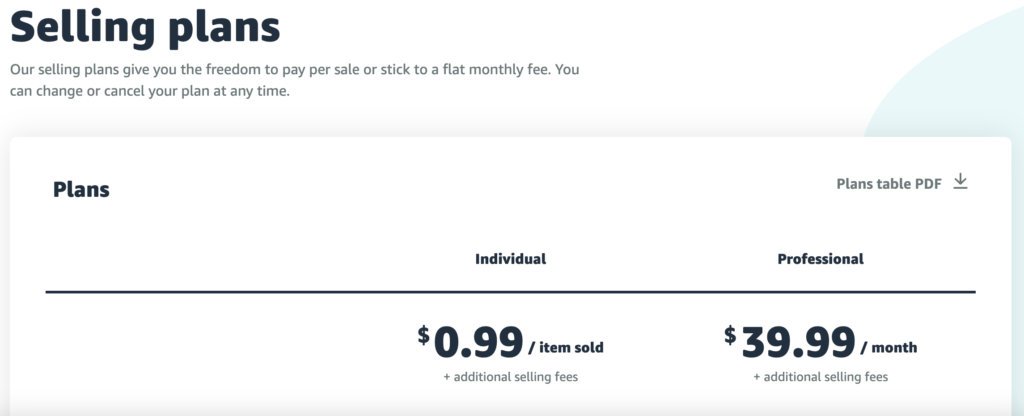
Referral Fees
Sellers incur a referral fee on each Amazon sale, which varies by product category. For instance, books attract a 15% referral fee plus a $1.80 closing fee, while cell phones have an 8% referral fee. Refer to the table below for a comprehensive list of categories and their respective referral fees.
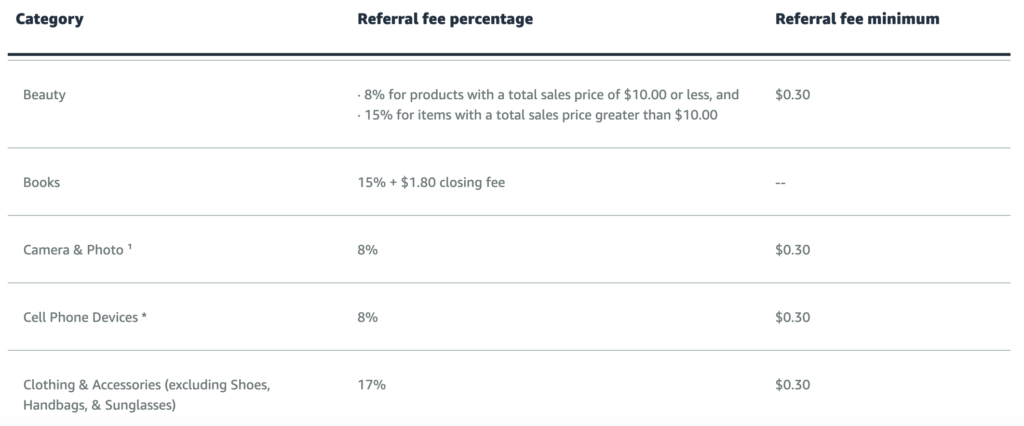
Removal Order Fees
These are levied per item removed from Amazon fulfillment centers, based on the product's size and weight, as outlined in the table provided.

Detailed Guide to Removal Order Fees
Returns Processing Fees
Exclusive to customer-returned products within categories eligible for Amazon's free return shipping (e.g., apparel, jewelry, shoes, handbags, luggage). Amazon offers free returns on these products to enhance customer trust and stimulate sales.
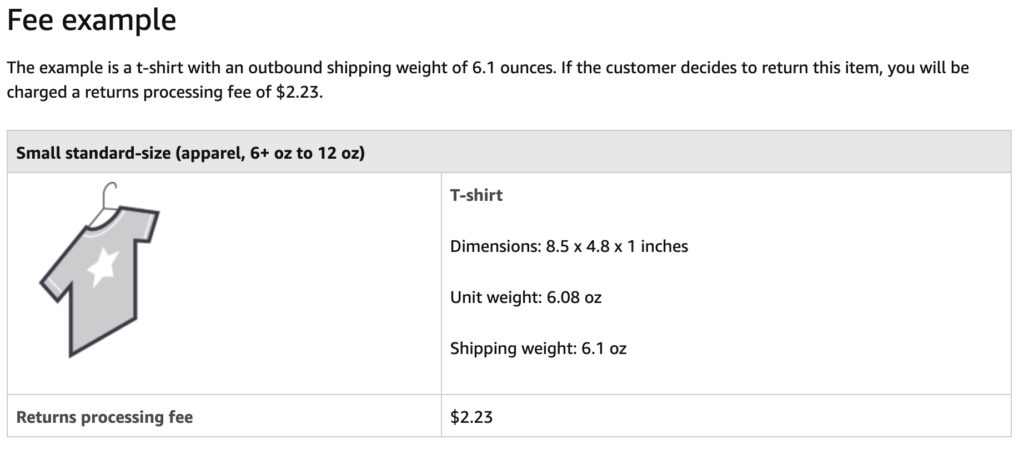
Opt-in for FBA Small and Light Program for Cost Reduction
Eligible for FBA Small and Light are new products measuring 15”x 12”x 0.75” or smaller and weighing 12 oz. or less, reducing fulfillment costs. Refer to the table below for qualifying product dimensions.
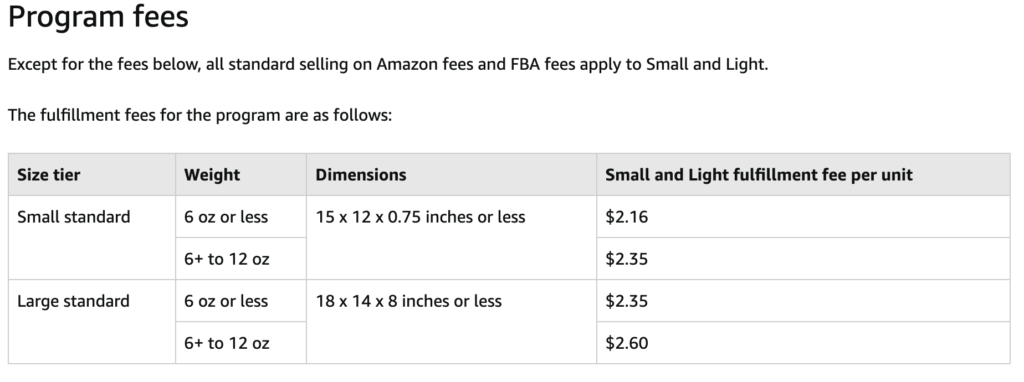
Some types of products, including food, alcohol, and certain electronics, aren’t eligible for Small and Light. For a complete list of restricted products, check here.
Want to enroll in FBA Small and Light? Check out the guidelines here.
Unlock Cross-Platform Selling Bliss via 4Seller to Automate Amazon FBA Fulfillment Across TikTok, Temu, Shopify & More
Imagine being able to process orders from TikTok's burgeoning e-commerce scene, Temu's affordable offerings, Shopify's versatile stores, and countless other platforms – all through the powerful infrastructure of Amazon FBA. With 4Seller logistic rule, this vision becomes a reality. Our innovative platform seamlessly integrates with your Amazon FBA account, allowing you to automatically fulfill orders placed on any sales channel you operate on. No more manual data entry, no more time-consuming order management – just pure productivity and peace of mind.
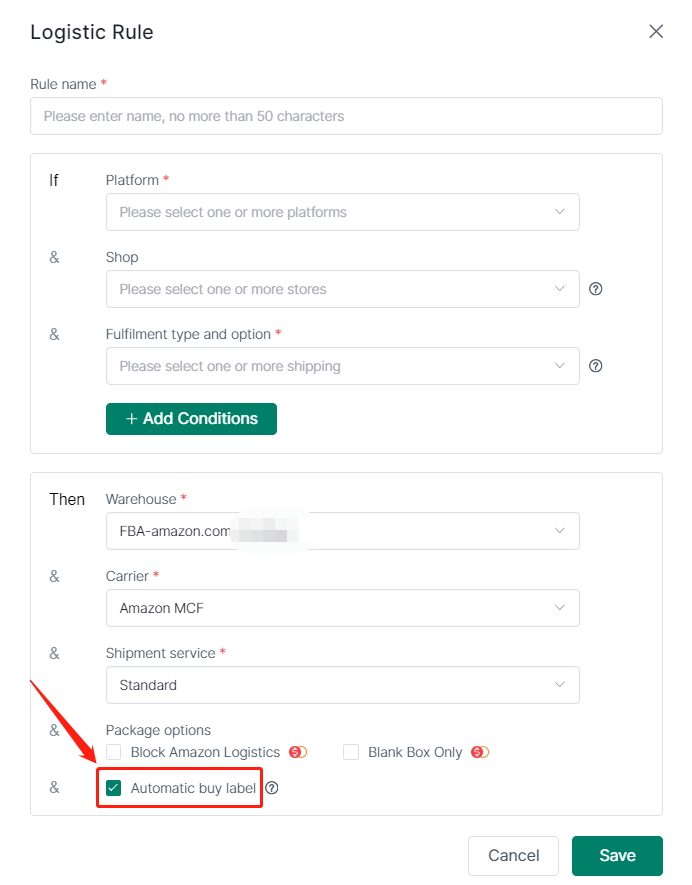
Check out the logistics rule guidelines here
Conclusion
Mastering Amazon FBA fees is essential for any seller looking to maximize profits and stay competitive on the world's largest online marketplace. By leveraging the power of 4Seller, you can automate your cross-platform fulfillment operations, freeing up time and resources to focus on growing your business. With enhanced visibility, automated fulfillment, and seamless integration with leading sales channels, 4Seller is the key to unlocking your e-commerce potential and driving success in today's dynamic market.
- Order Management
- TikTok Shop
- Temu
- About 4Seller
- Amazon
- Shopify
- Inventory Management
- Amazon MCF&FBA
- Seller Tips
- Listing Management
- UPS
- Amazon Shipping
- FedEx
- DHL Express
- Creator Bulk Invite
- eBay
- GLS
- Shein
- Marketplace News
- Inventory Sync
- Multi-channel Store
- Royal Mail
- Amazon MCF
- Walmart
- Walmart WFS
- WooCommerce
- Shipping Integration
- Poste Italiane
- PayPal Tracking Sync
- BRT
- Beginner Tutorial
- ShipHero
- Shipping Label
- CaiNiao
- Stripe Tracking Sync
- UniUni
- USPS
- Yodel
- CIRRO
- Chronopost
- Correos
- Correos Express
- Deutsche Post
- Logistics Rule
- 3PL
- Kaufland
- GOFO
- OTTO
- DHL Parcel
- Evri
- Etsy
- FBM
- DHL
- AliExpress
- DPD
- SPU Catalog
- Cdiscount
- ShipBob
- OMS
- Request Review
- Price Sync
- Platform Integration
- 17 Dec,2024
- 17 Dec,2024
